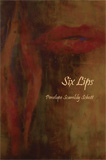March 15, 2010SIX LIPS
Review by Claire Keyes 
Mayapple Press, 2009
408 N. Lincoln Street
Bay City, MI 48708
ISBN 978-0-932412-84-3
2010, 80 pp., $15.95
www.mayapplepress.com
Six Lips is dazzling. Were it for its language alone, I would savor these poems again and again if only to get some relief from the pedestrian gumbo of contemporary speech. Schott takes her readers for a ride as thrilling for us poetry readers as “Avatar.” Her imagination knows no bounds and she accomplishes her feats with the time-honored tool of language alone. Six lips? At least.
Even so, she doesn’t fly off into the stratosphere. Like Frost’s climber of birches, she knows that “Earth’s the right place for love.” She says as much in “Why I Did Not Wish to Float in Space,” one of my favorite poems in the book. She opens with a series of questions reminiscent of God lecturing Job on his powers. For example: “Who spread the western horizon to snip/ the orange sun in half.” She then proceeds to ask an even more impossible question:
Can you feel how our planet spins in a void,
how the shallow mantle, hauling its fur coat
of forest, its slippery skin of ocean, seems
inconsequential over the molten core?
Note the rightness of the line-break after “fur coat” and the aptness of the ocean’s “slippery skin.” Note also that as the poem builds, it becomes more intimate:
I’ve lost my footing in the belly of curled roots,
and I’m scared of falling, of lurching clear out
into space—nothing on earth to touch. Pull me
back by a finger, will you?
What captures me in this poem is the surprising turn it takes to the intimate gesture of “Pull me/ back by a finger, will you?” Her meditation on the vastness of the universe turns into a love poem, concluding with “Please?/ Here, in the motionless house, my face/ brushed by your glance.” What makes Six Lips so compelling is how unpredictable Schott is.
Penelope Scambly Schott is unabashedly female and yet, in a way, post-feminist. She simply is who she is and more power to her. “Counting the Body,” the long poem which occupies the center of this collection, makes her attitude towards herself abundantly clear. Each section plays with a number. She requires
Six lips to sip the sublime,
two for the mouth and four for the vulva
plump as succulents and shining with dew—
ah, youth; ah, time.
The naturalness of the rhyme (lips/sip) and the abundant alliteration characterize her versifying and also lead to the nostalgic note at the end. These are not the poems of a young woman, but youthful exuberance pervades the volume.
In the last section of the poem, she imagines what it would be like “If I Had Ten Thumbs”:
I would wear pink leather shoes with velcro straps
I would strike matches on the sole of my shoe
I would suck firmly on my ten wet thumbs
I would practice exactly how to suck
with rapt attention and rhythm
so as to gratify any man
and I would do it
yes I would
do that
yes
The voice of these poems is often playful and funny. At the same time the overall tenor of this book is conditioned by the impending death of her mother. The poems get darker as the poet meditates on time and aging. As she says in “Eclipse”: “This is the world that ends over and over and then/ goes on without us, our tiny smudge of time.”
Schott is blessed, however, with a flexible consciousness. At home with animals or the stars, she gives a sense of her life as a succession of lives. Aware of the natural world, she suggests the transmigration of her soul into a screech owl or a horse. Such poems tend to be upbeat and thrilling, but the excruciating demise of her mother haunts the speaker of these poems. She finally gives way to addressing her mother’s death and dying.
Typically, she refuses sentimentality. In “Heart Failure,” she writes: “This is the year I would like to find pity. I would like/ to hurt for my mother the way I ache for my children.” As much as she would like to develop this feeling, it eludes her: a failure of her heart: “I want to be sad that she’s eighty-seven and fading.” Through her use of anaphora and an accretion of brilliant details, Schott builds up the image of her mother:
She lives in her elegant house like a black pearl
from a broken oyster drifting under reefs in a bay.
she lives in her house like a startled rabbit unable
to finish crossing the road.
The poem startles when the speaker imagines killing her mother, as an act of pity:
If I had enough pity,
I would dare squeeze her fragile neck and kiss
her forehead as I press down on her windpipe and keep
on pressing with my strong and generous thumbs.
The poem, however, does not end there. Schott’s spirit is too magnanimous, and her mother changes, showing a gentle “appreciation” of nature that Schott finds surprising. Her mother “watches the squirrels scamper up black bark/ like acrobats of joy.” In fact, Schott doesn’t recognize the person her mother has become:
This drowning old lady is not my mother. Not
abrupt. As I stroke her knuckles, grace glints
in our salt hands.
Drowning because she is dying, the mother undergoes a kind of transformation, as does the daughter. For both of them, there is a communion, a touch of being to being.
While I admired A is for Anne, Schott’s previous book, for her deft handling of the life of Anne Hutchinson, Six Lips takes its readers to a new place through her language and style, but also through her openness, her dexterity, her seemingly boundless range of being in the world. She’s a stunning poet.